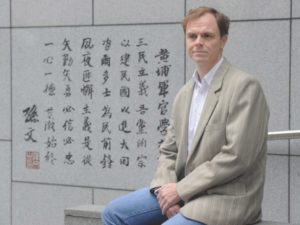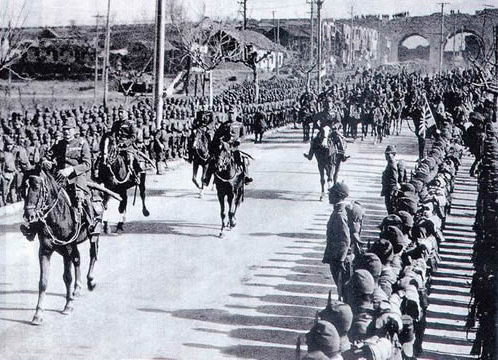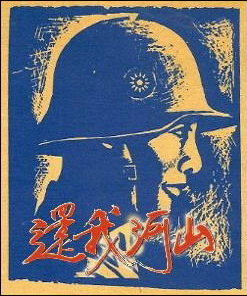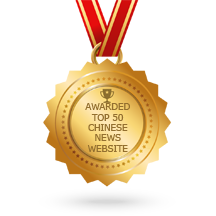Englishman Stuart Heaver, a former Naval officer and now a full-time freelance writer, has just published an engaging piece in the South China Morning Post about the 1937 Nanjing massacre and how it was perceived in Hong Kong and the West (read it here). As part of his research, he interviewed Peter Harmsen, author of Nanjing 1937: Battle for a Doomed City. Below, with Heaver’s kind permission, is the full Q&A:
The Nanjing massacre is now widely commemorated in China and a key part of patriotic education but how big a deal was it in the winter of 1937/38?
The event wasn’t ignored. Violence on such a scale imposed on a national capital was bound to be noticed, but initially the true scale of the horror was not fully appreciated. For example, a long and detailed report about conditions in Nanjing appeared on the front page of The New York Times in early January 1938, but when it came to casualty figures it estimated that about 20,000 Chinese soldiers had been executed. There was a general feeling that what had happened was bad, but the event was very far from having the iconic stature that it has attained in recent decades.
Might it have been forgotten about as another wartime atrocity if the western witnesses were not present?
It’s an interesting counterfactual question. Some other atrocities, such as the Japanese rape and murder of civilians following the capture of the city of Baoding in September 1937, have left a much smaller mark on public consciousness, and the absence of a large number of foreign witnesses may be partly to blame for this, but then on the other hand, they were also significantly smaller atrocities, which may have been why they have attracted less attention.
As for Nanjing, even in the absence of the foreign witnesses, it would probably have ended up being a big deal in post-war China. The Communist regime after 1949 seized on the Nanjing massacre as an example where arch rival Chiang Kai-shek had allegedly failed as leader, abandoning tens of thousands of soldiers and civilians to a sinister fate.
The foreign witnesses have never been needed to make a persuasive case that something extraordinarily horrible had happened in Nanjing. Indeed, the historical sources are huge and varied. The semi-official Chinese collection of documents related the massacre, in which the foreign testimony takes up only a small part, runs to more than 70 volumes.

Peter Harmsen
The battle leading up to the occupation of Nanjing was a savage affair. Was the subsequent massacre an extension or product of this intense fighting?
The origins of the massacre are multiple and complex, and it would be wrong to resort to single-cause explanations, but I consider it clear that the cumulative effect of months of brutal warfare was a key factor. Some of the Japanese soldiers had been in continuous combat since the late summer, in conditions that often were as horrendous as the war in the trenches during the Great War, with the key difference that in China neither side was in the habit of taking prisoners.
One should also not dismiss the impact of official Japanese propaganda. In the early days of the conflict, in July 1937, Chinese auxiliary troops hired by the Japanese had abruptly shifted loyalties and carried out a massacre of Japanese and Korean civilians in the city of Tongzhou near Beijing. Japanese media made maximum use of this event, and the battle cry of “avenge Tongzhou!” became common among the Japanese rank and file.
These circumstances are meant not to excuse the unforgivable Japanese behavior in Nanjing, but as pieces of a puzzle that can bring us a little closer to an understanding. However, complete understanding is unlikely to ever be achieved. There is a core of inexplicable horror attached to events such as the Nanjing massacre, which says something deep and sinister about human nature and about our propensity to inflict pain on fellow human beings because we can and because we like it.
Why didn’t Chiang Kai-shek make more effort to use the Nanjing massacre as a propaganda tool to obtain more support from the West?
There is a remarkable lack of contemplation in Chiang’s diaries immediately following the Nanjing massacre, so we can mainly just speculate. Executing prisoners and raping civilians were hardly unique actions per se, and like everyone else, Chiang probably had no immediate idea of the actual extent of the atrocities. He may also have dismissed some of the early reports as exaggerated rumors. In addition, he may not have considered it in his interest to attract attention to the recent defeat at Nanjing. Not only had the city fallen with surprising ease, but his government had failed in its obligation to ensure the safety of the city’s residents.
T
he Hong Kong press which was more fixated on the Panay incident, in which Japanese planes attacked an American gunboat. Any ideas on this?
If you look at the contemporary newspaper reports, one of the most striking aspects is the way life is valued differently based on ethnicity. The relatively scattered instances when foreigners were killed or otherwise harmed received a disproportionate amount of attention in the media reports. The Panay incident is a great example of this, as is an earlier incident when the British ambassador’s car was strafed by a Japanese plane and His Majesty’s envoy was injured. This merited far more extensive coverage than the deaths of thousands of nameless Chinese.
How significant was the reported brutality in turning international public opinion against Japan?
There was an impact, but it was marginal. In the western democracies there was a much more immediate concern, named Hitler, and what happened half a world away seemed rather remote and unreal. The atrocity reports, horrific as they might be, were not of a nature that could sway public opinion one way or the other, the way that, for instance, near-real time TV turned the American public against the war in Vietnam 30 years later. Moreover, some of the reports coming out of China were simply too brutal to be widely believed. Reader’s Digest published some of these reports and received complaints from subscribers for printing what was slammed as the “fabrications” of Chinese propaganda.
Relations became very strained between the USA and Japan. Do you think there was ever any risk of the USA entering the war in an active or covert capacity?
Active participation, very unlikely. Roosevelt was a year into his second term, and was getting ready to challenge the isolationists. He had issued his so-called “quarantine speech” in October 1937, calling for ostracizing the rogue states of the day, including Japan, and he had been surprised by the extent of the negative reaction. The American public, and a large part of the political and business elite, was simply not ready to contemplate another world war. Behind the scenes, however, the US government was gradually getting ready for conflict with Japan as a medium-term prospect, materialized in stepped-up coordination with the British government and a more ambitious naval build-up.





 Copyright © 2025
Copyright © 2025
Well, in the end Roosevelt got his war. He cut off Japan’s oil supply, which caused them to declare war. Good job there, warmonger.
Thank you for your contribution about Shanghai, Nanjing and the war Chinese people resisted against Japanese armies.
I read Shanghai 1937 and gained much achievements due to your details in the book, I will read Nanjing 1937.